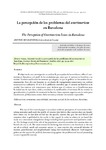Mostrar o rexistro simple do ítem
La percepción de los problemas del overtourism en Barcelona
| dc.contributor.author | Álvarez-Sousa, Antonio | |
| dc.date.accessioned | 2021-05-20T18:27:10Z | |
| dc.date.available | 2021-05-20T18:27:10Z | |
| dc.date.issued | 2021 | |
| dc.identifier.citation | Álvarez Sousa, A. (2020). La percepción de los problemas del overtourism en Barcelona. RECERCA. Revista De Pensament I Anàlisi, 26(1), 59-92. https://doi.org/10.6035/Recerca.2021.26.1.4 | es_ES |
| dc.identifier.issn | 2254-4135 | |
| dc.identifier.uri | http://hdl.handle.net/2183/27963 | |
| dc.description.abstract | [Resumen] El objetivo deesta investigación es analizar la percepción de los residentes sobre el over-tourismen Barcelona y el perfil de los ciudadanos que creen que el turismo no beneficia a su ciudad. También analizamos los motivos que alegan y lo que se publica en los medios de co-municación. Para ello nos basamos en un diseño de triangulación concurrente con análisis cuantitativo y cualitativo. El 16% de la población considera que el turismo no beneficia a la ciudad. Los motivos más importantes para declarar que el turismo no es beneficioso para laciudad son de tipo ético, social y económico: la masificación, el incivismo de los turistas, la gentrificación y la pérdida de esencia de los barrios. Estos aspectos negativos son la razón para manifestarse públicamente contra dicho turismo y reclamar un turismo responsable. | es_ES |
| dc.description.abstract | [Abstract] The aim of this research paper is to analyze residents’perception of overtourismin Bar-celona nowadays andstudy the profile of citizens who believe that tourism does not benefit their home city. It also aims to find out the specific reasons they give for such beliefs and examines what is published in the media in this regard. In order to achieve it, we based the study on a concurrent triangulation design including both quantitative and qualitative analy-sis. The findings revealed that 16% of the population currently considers that tourism does not benefit the city at all. The main reasons for declaring that tourism is not beneficial to the city are of an ethical, social and economic nature; i.e. mass tourism, the antisocial behavior of tourists, gentrification and neighborhoods losing their traditional character. Such negative points are the reasons for publiclydemonstrating against the problem and instead promoting a more responsible tourism. | es_ES |
| dc.language.iso | spa | es_ES |
| dc.publisher | Universitat Jaume I de Castellón, Departamento de Filosofía y Sociología | es_ES |
| dc.relation.uri | http://dx.doi.org/10.6035/Recerca.2021.26.1.4 | es_ES |
| dc.rights | Atribución-CompartirIgual 4.0 Internacional (CC BY-SA 4.0) | es_ES |
| dc.rights.uri | https://creativecommons.org/licenses/by-sa/4.0/deed.es | * |
| dc.subject | Overtourism | es_ES |
| dc.subject | Sostenibilidad | es_ES |
| dc.subject | Incivismo | es_ES |
| dc.subject | Actitud de los residentes | es_ES |
| dc.subject | Barcelona | es_ES |
| dc.subject | Sustainability | es_ES |
| dc.subject | Incivism | es_ES |
| dc.subject | Resident attitude | es_ES |
| dc.title | La percepción de los problemas del overtourism en Barcelona | es_ES |
| dc.title.alternative | The Perception of Overtourism Issues in Barcelona | es_ES |
| dc.type | info:eu-repo/semantics/article | es_ES |
| dc.rights.access | info:eu-repo/semantics/openAccess | es_ES |
| UDC.journalTitle | RECERCA: revista de pensament i anàlisi | es_ES |
| UDC.volume | 26 | es_ES |
| UDC.issue | 1 | es_ES |
| UDC.startPage | 59 | es_ES |
| UDC.endPage | 92 | es_ES |
| dc.identifier.doi | 10.6035/Recerca.2021.26.1.4 |
Ficheiros no ítem
Este ítem aparece na(s) seguinte(s) colección(s)
-
GI-GET - Artigos [38]






